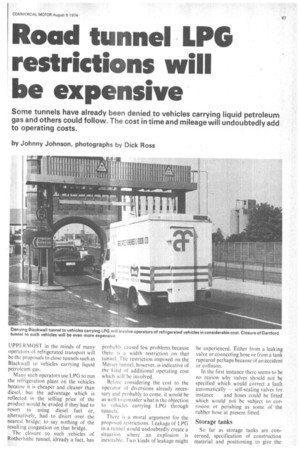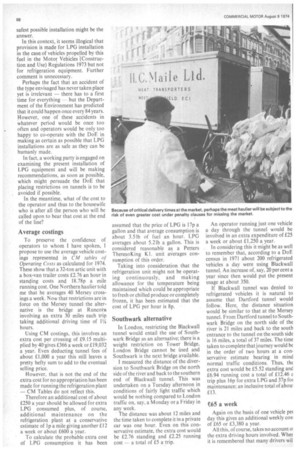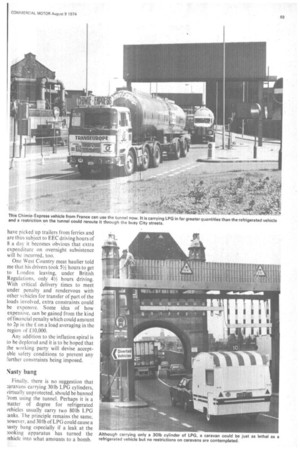Road tunnel LPG restrictions will be expensive
Page 69

Page 70

Page 71

If you've noticed an error in this article please click here to report it so we can fix it.
Some tunnels have already been denied to vehicles carrying liquid petroleum gas and others could follow. The cost in time and mileage will undoubtedly add to operating costs.
by Johnny Johnson, photographs by Dick Ross UPPER MOST in the minds of many operators of refrigerated transport will be the proposals to close tunnels such as Black wall to vehicles carrying liquid petroleum gas.
Many such operators use LPG to run the refrigeration plant on the vehicles because it is cheaper and cleaner than diesel, but the advantage which is reflected in the selling price of the product would he eroded if they had to resort to using diesel fuel or, alternatively, had to divert over the nearest bridge; to say nothing of the resulting congestion on that bridge.
The closure to such vehicles of Rotherhithe tunnel, already a fact, has probably caused few problems because there is a width restriction on that tunnel. Th'e restriction imposed on the Mersey tunnel, however, is indicative of the kind of additional operating cost which will he involved.
Before considering the cost to the operator of diversions already necessary and probably to come, it would be as well to consider what is the objection to vehicles carrying LPG through tunnels.
There is a moral argument for the proposed restrictions. Leakage of LPG in a tunnel would undoubtedly create a situation where an explosion is inevitable. Two kinds of leakage might be experienced. Either from a leaking valve or connecting hose or from a tank ruptured perhaps because of an accident or collision.
In the first instance there seems to be no reason why valves should not be specified which would correct a fault automatically — self-sealing valves for instance and hoses could be fitted which would not be subject to corrosion or perishing as some of the rubber hose at present fitted.
Storage tanks So far as storage tanks are concerned, specification of construction material and positioning to give the safest possible installation might be the answer.
In this context, it seems illogical that provision is made for LPG installation in the case of vehicles propelled by this fuel in the Motor Vehicles .(Construction and Use) Regulations 1973 but not for refrigeration equipment. Further comment is unnecessary.
Perhaps the fact that an accident of the type envisaged has never taken place yet is irrelevant -there has to a first time for everything but the Department of the Environment has predicted that it could happen once every 84 years. However, one of these accidents in whatever period would be once too often and operators would be only too happy to co-operate with the DoE in making as certain as possible that LPG installations are as safe as they can be humanly made.
In fact, a working party is engaged on examining the present installation of LPG equipment and will be making recommendations, as soon as possible, which might persuade the DoE that placing restrictions on tunnels is to be avoided if possible.
In the meantime, what of the cost to the operator and thus to the housewife who is after all the person who will be called upon to bear that cost at the end of the line?
Average costings
To preserve the confidence of operators to whom I have spoken, I propose to use the average vehicle costings represented in CM tables of Operating Costs as calculated for 1974. These show that a 32-ton artic unit with a box-van trailer costs £2.76 an hour in standing costs and 18,78p a mile running cost. One Northern haulier told me that he averages 40 Mersey crossings a week. Now that restrictions are in force on the Mersey tunnel the alternative is the bridge at Runcorn involving an extra 30 miles each trip taking additional driving time of 11/4 hours.
Using CM costings, this involves an extra cost per crossing of £9.15 multiplied by 40lives £366 a week or £19,032 a year. Even deducting tunnel fees of about £1,000 a year this still leaves a pretty hefty sum to add to the eventual selling price.
However, that is not the end of the extra cost for no appropriation has been made for running the refrigeration plant — CM Tables do not reflect this.
Therefore an additional cost of about £250 a year should be allowed for extra LPG consumed plus, of course, additional maintenance on the refrigeration plant at a conservative estimate of lp a mile giving another £12 a week or about £600 a year.
• To calculate the probable extra cost of LPG consumption it has been assumed that the price of LPG is 17p a gallon and that average consumption is about 3.5 lb of fuel an hour. LPG averages about 5.21b a gallon. This is considered reasonable as a Petters ThermoKing K1. unit averages consumption of this order.
Taking into consideration that the refrigeration unit might not be operating continuously, and making allowance for the temperature being maintained which could be appropriate to fresh or chilled produce or completely frozen, it has been estimated that the cost of LPG per hour is 8p. •
Southwark alternative
In London, restricting the Blackwall tunnel would entail the use of Southwark Bridge as an alternative; there is a weight restriction on Tower Bridge, London Bridge cannot be used and Southwark is the next bridge available.
I measured the distance of the diversion to Southwark Bridge on the north side of the river and back to the southern end of Blackwall tunnel. This was undertaken on a Tuesday afternoon in conditions of fairly light traffic which would be nothing compared to London traffic on, say, a Monday or a Friday in any week.
• The distance was about 12 miles and the time taken to complete it in a private car was one hour. Even on this conservative estimate, the extra cost would be £2.76 standing and £2.25 running cost — a total of £5 a .trip. An operator running just one vehicle a. day through the tunnel would be involved in an extra expenditure of £25 a week or about £1,250 a year.
In considering this it might be as well to remember that, according to a DoE census in 1971 about 200 refrigerated vehicles a day were using Blackwall tunnel. An increase of, say, 20 per cent a year since then would put the present usage at about 350.
If Blackwall tunnel was denied to refrigerated vehicles it is natural to assume that Dartford tunnel would follow. Here, the distance situation would be similar to that at the Mersey tunnel. From Dartford tunnel to Southwark Bridge on the north side of the river is 21 miles and back to the south entrance to the tunnel on the south side is 16 miles, a total of 37 miles. The time taken to complete that journey would be in the order of two hours at a conservative estimate bearing in mind normal traffic conditions.. Thus, the extra cost would be £5.52 standing and £6.94 running cost a total of £12.46 t trip plus 16p for extra LPG and 37p foi maintenance; an inclusive total of abou, £13.
£65 a week
Again on the basis of one vehicle pei day this gives an additional weekly cos, of £65 or £3,380 a year.
All this, of course, takes no account a the extra driving hours involved. Whet it is remembered that many drivers wil have picked up trailers from ferries and are thus subject to EEC driving hours of 8 a day it becomes obvious that extra expend iture on overnight subsistence will he incurred, too.
One West Country meat haulier told me that his drivers took 51/2 hours to get to London leaving, under British Regulations, only 41/2 hours driving. With critical delivery times to meet under penalty and rendezvous with other vehicles for transfer of part of the loads involved, extra constraints could be expensve. Some idea of how expensive, can be gained from the kind of financial penalty which could amount to 2p in the t on a load averaging in the region of £10,000.
Any addition to the inflation spiral is to be deplored and it is to be hoped that the working party will devise acceptable safety conditions to prevent any further constraints being imposed.
Nasty bang Finally, there is no suggestion that caravans carrying 30lb LPG cylinders, virtually unprotected, should be banned from using the tunnel. Perhaps it is a :natter of degree for refrigerated vehicles usually carry two 801b LPG :anks. The principle remains the same, lowever, and 301b of LPG could cause a tasty bang especially if a leak at the
































































































































